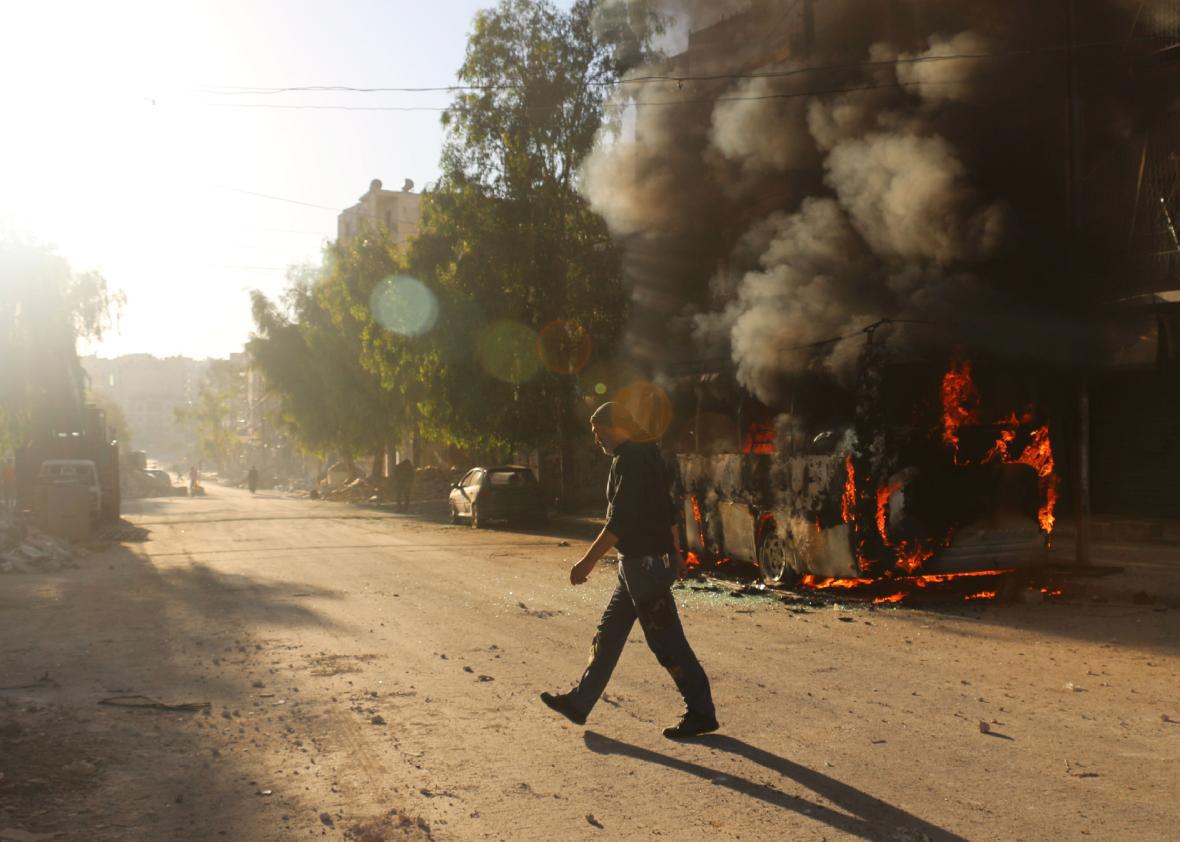As Hillary Clinton and Donald Trump prepare to face off for their first televised debate Monday night, dozens of airstrikes have been pounding rebel-held areas of Aleppo, Syria, killing an estimated 400 people in the past week. There appears to be little hope of a diplomatic breakthrough to revive the Syrian cease-fire that collapsed last week, and the 5-year-old conflict is likely to come up in Monday night’s debate. While U.S. voters are paying closer than normal attention to foreign policy in this election, what the candidates say about the war will be of even greater interest to those in Syria. At the moment, it looks like the future of this election may be the most important determining factor in the war going forward.
Though Secretary of State John Kerry is still holding out hopes for reviving the cease-fire, it seems the Obama administration has mostly given up on the U.S. playing any positive role in resolving Syria’s civil war. Meanwhile, regime and anti-government rebel forces have reached a stalemate around Aleppo, the country’s most important battlefield. The Russian-backed government doesn’t appear to have the manpower to retake a significant amount of territory from the rebels and has opted instead to use its airpower advantage to bomb rebel-held areas, with civilians bearing the brunt of devastation. Anti-government rebels make periodic gains, but are hampered by a lack of supplies and infighting within their fractious coalition. Neither side is ready to give up, but neither has victory within sight.
One big thing, maybe the only big thing, that could change that is a new American president. Clinton doesn’t share her old boss’ skittishness about foreign entanglements. As secretary of state, she pushed (successfully) for the air campaign that toppled Muammar al-Qaddafi’s regime in Libya and (unsuccessfully) for arming Syria’s rebels early in the conflict, a step she has argued would have prevented the situation from getting so out of hand. She has broken with the Obama administration to call for the establishment of a no-fly zone in Syria, a step Turkey and other governments backing the rebels have also proposed. This could all just be campaign rhetoric, of course, but for a beleaguered Syrian opposition looking for any sign of hope, Clinton may be it.
A Trump victory, on the other hand, would likely be a shot in the arm for the Assad regime. Trump, as has been well-documented, is an admirer of Assad’s main international patron, Vladimir Putin, and has supported the Russian president’s intervention in Syria. He has said he has no interest in removing Assad, and has more or less endorsed the Russian/regime argument that all anti-Assad rebels are indistinguishable from terrorist groups like ISIS.
Given the stark contrast and the fact that polls are tightening, if I were making decisions about strategy in the presidential palace in Damascus or a rebel bunker in Aleppo, I would see little reason to stop fighting before the election. Why make any concessions now, when you could be in a much stronger position come January? Even if sanity returns to the polls and a Clinton victory looks more assured, the regime would likely only ramp up airstrikes in hopes that there simply won’t be any rebels left for Clinton to support. The New York Times’ Anne Barnard suggested this scenario earlier this month, writing that the various actors in Syria “are scrambling as the clock runs out on the tenure of President Obama” to “establish facts on the ground.”
Candidates do sometimes tend to overestimate their own impact on world events. Despite what innumerable Republicans running for office have told you, the Iranians did not actually release their American hostages because they were afraid of Ronald Reagan. But the uncertainty of the U.S. presidential election cycle can certainly play on the decision-making of foreign leaders.
One analogous case is the 1968 election, dominated by debate over U.S. policy in Vietnam. The North Vietnamese had launched the Tet Offensive in January of that year, convincing many Americans that the war was unwinnable and leading, in part, to Lyndon Johnson’s decision not to run for re-election. But by October, peace talks in Paris were making more progress than expected, which could have allowed Johnson to halt the bombing of North Vietnam and give a major boost to the Democrats and their candidate, Hubert Humphrey. There have been media reports for years, corroborated in an interview a few years ago with a former Nixon aide, that the Nixon campaign encouraged the South Vietnamese to drop out of the talks, assuring them they would get a much better deal with Nixon in office. Recently released tapes make it clear that Johnson believed Nixon had intentionally scuttled the talks and accused him of “treason.” (The Vietnam example is also a cautionary tale for anyone pinning their war hopes on a U.S. election outcome. Given how the war ultimately turned out for them, the South Vietnamese probably should have taken the deal when they had the chance.)
Of course, there’s no evidence that either campaign is actually communicating with their favored proxies in Syria (though it’s not hard to imagine how those backchannels would operate if they did exist). But they probably don’t need to. It’s clear to anyone watching that Obama has no plans to make any big changes to Syria policy before he leaves office, and that things might change significantly—one way or another—next year. Unfortunately, that means that all the incentives are to keep up the killing until then.
